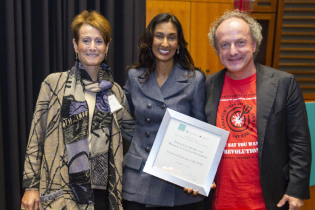Padmanee Sharma, MD, PhD, of The University of Texas MD Anderson Cancer Center, has been recognized for her contributions to the field of immuno-oncology with the Pandolfi Award for Women in Cancer Research at the 11th Annual Beth Israel Deaconess Medical Center Cancer Symposium.

Dinah Singer, PhD, of the National Cancer Institute (left), and Pier Paolo Pandolfi, MD, PhD, of the Cancer Center and Cancer Research Institute at BIDMC (right), presented Padmanee Sharma, MD, PhD, of the University of Texas MD Anderson Cancer Center, with the Pandolfi Award for Women in Cancer Research.
Dr. Sharma was selected for the award following a peer-review process of colleagues in the cancer community to recognize the achievements of women in cancer research. She is the second honoree, following Johanna Joyce, PhD, of the Swiss Cancer Center Lausanne at the University of Lausanne, who was recognized in 2017.
“This award is very personal to me, and I want to formally honor the achievements of women in science,” said Pier Paolo Pandolfi, MD, PhD, Director of the Cancer Center and Cancer Research Institute at Beth Israel Deaconess Medical Center Cancer and host of the annual event, referring to the impact his career mentors and colleagues have had. “What’s especially impressive about Dr. Sharma is that her work as a physician-scientist straddles the intersection of patient care and research. If we want to move from the standard of care to the standard of cure, we need to rapidly translate our research milestones into clinical breakthroughs, and Dr. Sharma’s career provides a model for this paradigm. Through creative back and forth between benchwork and clinical trials, Dr. Sharma has made rapid strides in our understanding and treatment of cancer.”
Research Focus
Dr. Sharma, an oncologist specializing in the treatment of renal, bladder, and prostate cancers, focuses on understanding the interactions between tumors and their microenvironments, especially the immune system. Dr. Sharma was among the first to observe that anti–cytotoxic T-lymphocyte–associated protein 4 (CTLA-4) therapy and inducible T-cell costimulatory (ICOS)-positive T cells were necessary for the optimal destruction of tumor cells and that the ICOS molecule and its ligand ICOS-L are crucial players in optimizing antigen responses mediated by anti–CTLA-4 antibody. She continues to identify new therapeutic opportunities in immuno-oncology, such as the VISTA (V-domain immunoglobulin suppressor of T-cell activation) inhibitory pathway in prostate tumors after anti–CTLA-4 therapy.
“Immune checkpoint therapy has joined the ranks of surgery, radiation, and chemotherapy as a pillar of cancer treatment,” noted Dr. Sharma. “Multiple checkpoints exist and are dynamic in their expression, so they should be evaluated in both pre- and on-treatment human tumor samples to guide therapeutic decisions.” She added that these clinical trials provide a platform to study the biologic effects in patients, which in turn provides insights into the mechanisms that can be targeted for combining therapies. ■

